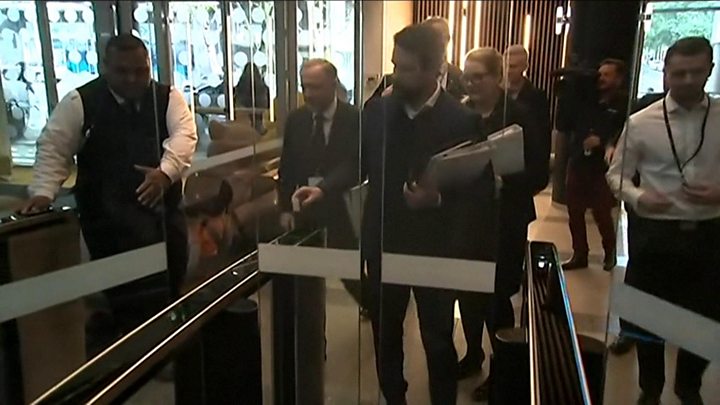
Media playback is unsupported on your device
Police raids this week on an Australian journalist's home and the Australian Broadcasting Corporation have left some people asking whether the country is doing enough to protect those who try to expose wrongdoing, as the BBC's Phil Mercer reports from Sydney.
In Stephen Spielberg's political blockbuster The Post, a publisher played by Oscar-winning actress Meryl Streep reveals secret and corrupt activities by the US government during the Vietnam War.
At risk are the central character's livelihood, liberty and the future of the Washington Post newspaper. The exposé was based on documents from a whistleblower.
David William McBride is no Hollywood leading man, but as the former Australian defence force lawyer charged with leaking classified papers at the centre of Wednesday's police raids at the Australian Broadcasting Corp (ABC), he has made breathtaking claims against the military and the government.
"It is everything like in the movies," Mr McBride told the BBC. "You are under surveillance a lot and it does get to you."
He is referring to his fight to air the truth about allegations that Australian special forces were involved in killing unarmed men and children while serving in Afghanistan.
"It is one thing fighting for an army in a war because you have a support group, but as a whistleblower you have none of that," he said.
"You're fighting a war on your own and your own sanity is often questioned by yourself and by others. It is a really miserable fight.
"I could see that the [Australian] government had become the worst threat to national security that we faced. They were no longer interested in actually defending the country. They were simply interested in defending themselves."
'They want to put me in jail'
Mr McBride is due to appear at the Australian Capital Territory's Supreme Court in Canberra on 13 June to face charges of leaking information to ABC journalists.
The information appeared in a series called The Afghan Files, published in July 2017. Mr McBride does not dispute that he gave material to the ABC but insisted he did so in the national interest.
It is a case that has very publicly highlighted Australia's attitudes to whistleblowers.
"It is one of the great ironies," he said. "They won't prosecute the journalist who published the story and they've got no intention of doing that, but they want to put me in jail for 50 years."
The day before Australian Federal Police (AFP) officers raided the Sydney headquarters of the ABC, the case of another high-profile whistleblower was in court.
Richard Boyle exposed abuses inside one of the country's most powerful institutions, the Australian Tax Office (ATO), including aggressive debt collection practices.
He told the Adelaide Magistrates Court that he plans to plead not guilty to 66 charges. The 43-year old former ATO staff member faces a maximum prison sentence of 161 years if found guilty.
Mr Boyle said he lost his job, suffered a breakdown and chronic insomnia, as well as stress-related heart problems.
'Rolls Royce v second-hand ute'
There are legal safeguards in Australia for those who expose malpractice or corruption, but Josh Bornstein, the head of employment law at Maurice Blackburn lawyers, believes they are inadequate.
"When it comes to whistleblower protection Australia is a backwater. Fundamentally Australian culture is hostile to whistleblowers and to those who dob [inform on others].
"They are punished for doing the right thing. In many cases their health collapses and they never work again. We see case after case after case of that in both in the private sector and in the public sector," he told the BBC.
"The US and Canada both have schemes in place that reward whistleblowers in the private sector, in particular. Those schemes are so good they would allow an employee to anonymously blow the whistle and retain their employment.
"That is a Rolls Royce scheme. In Australia, in comparison, we have a scheme that is akin to a beaten-up second-hand ute."
'Increasing authoritarian mood'
Australian Prime Minister Scott Morrison has responded to AFP raids this week on the ABC and the home of a News Corp journalist Annika Smethurst.
Speaking while at D-Day commemorations half a world away in the UK, Mr Morrison said that his centre-right government was committed to freedom of the press but that "no one is above the law".
"These are matters that were being pursued by the AFP operationally, at complete arm's length from the government… not at the instigation of government ministers," he added.
But there are fears that reporters in Australia are under political pressure like never before.
"I'm not saying this is just about the current government but we have seen an increasing authoritarian mood creeping into the way that the media is handled by the government," warned Prof Catharine Lumby from Macquarie University, a former press gallery journalist in Canberra.
"Central to the health of a good liberal democracy is a robust media and the protection of freedom of speech. These are principles that unfortunately we are seeing eroded around the western world. I would really hate to see Australia going down that path of intimidating whistleblowers or journalists," she added.
Meanwhile, Mr McBride, a former British army captain in the Blues and Royals, has said he is prepared for the fight of his life in court.
"I am a well-intentioned, true believer in what I am doing. I think I am right and I think that the government is corrupt," he said.
"Truth has a real power all of its own. I've lost my job and I've lost a lot of other things, but I've never felt richer."
https://www.bbc.com/news/world-australia-48537374
2019-06-06 09:38:40Z
CBMiMWh0dHBzOi8vd3d3LmJiYy5jb20vbmV3cy93b3JsZC1hdXN0cmFsaWEtNDg1MzczNzTSATVodHRwczovL3d3dy5iYmMuY29tL25ld3MvYW1wL3dvcmxkLWF1c3RyYWxpYS00ODUzNzM3NA
Tidak ada komentar:
Posting Komentar